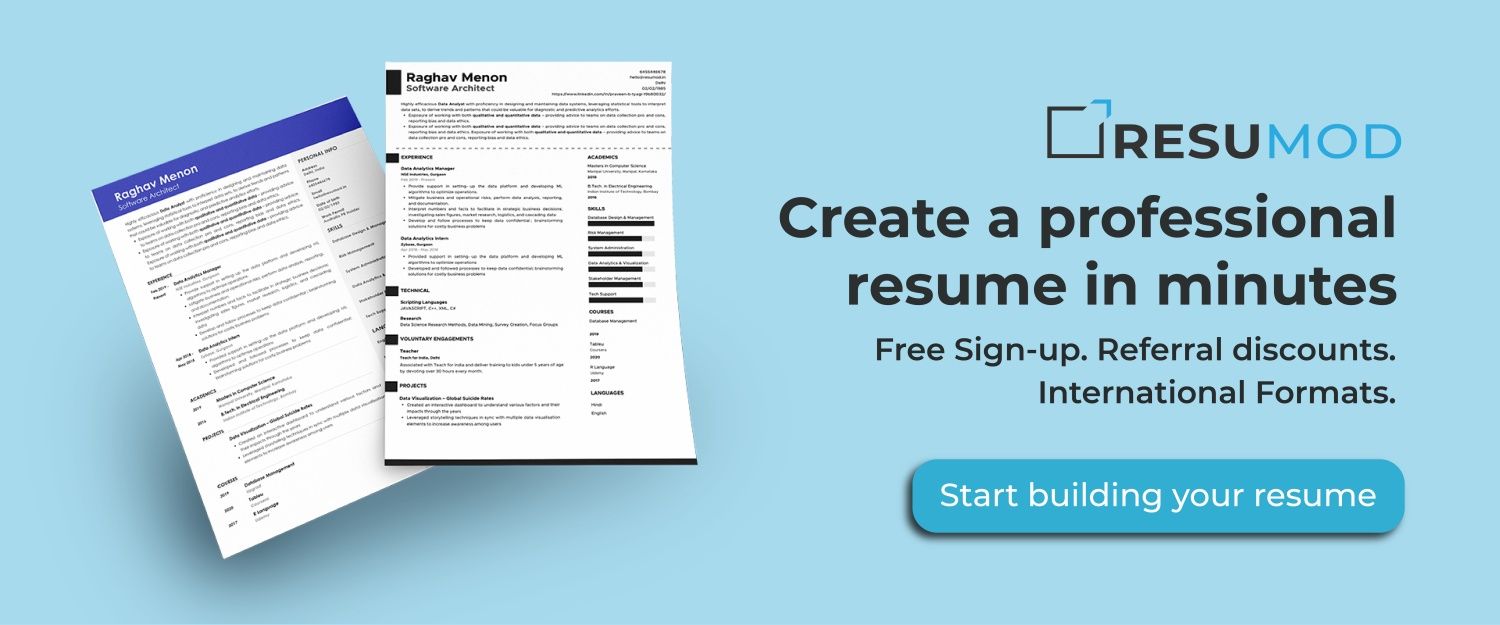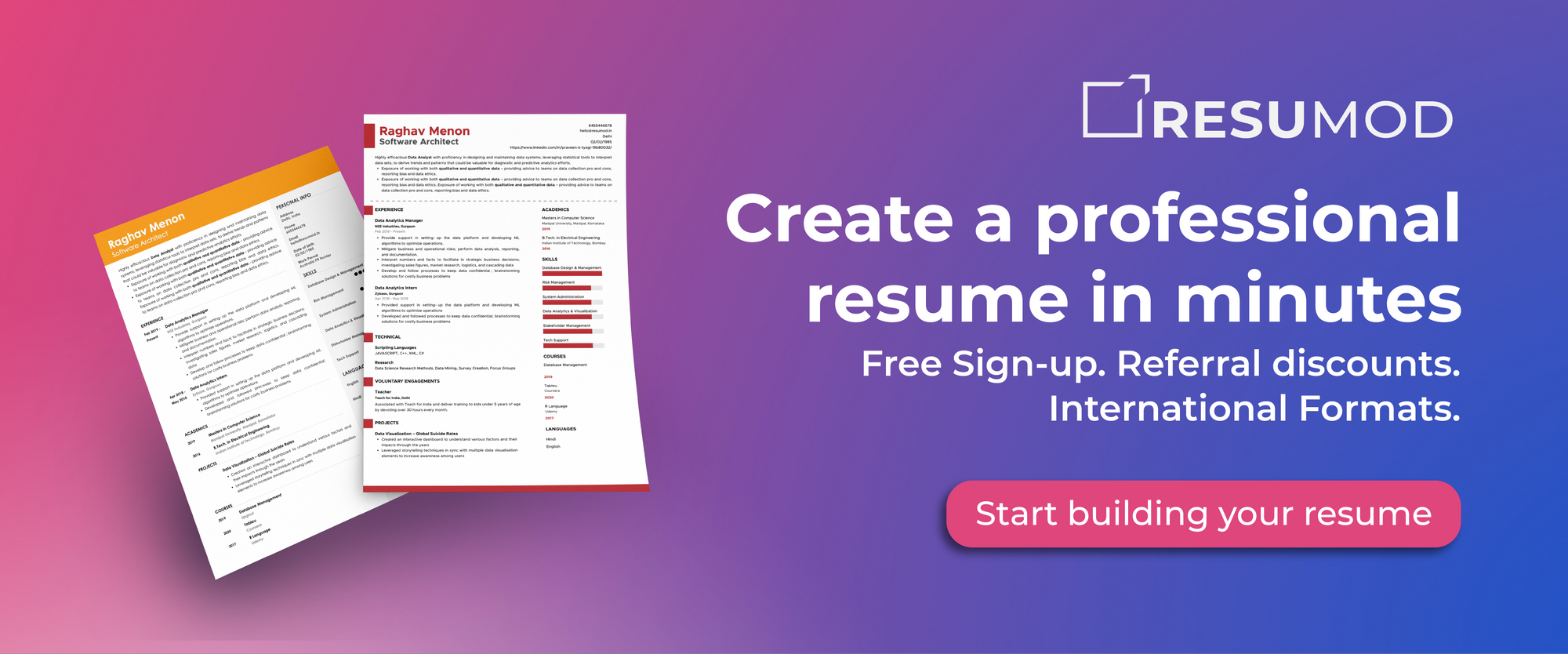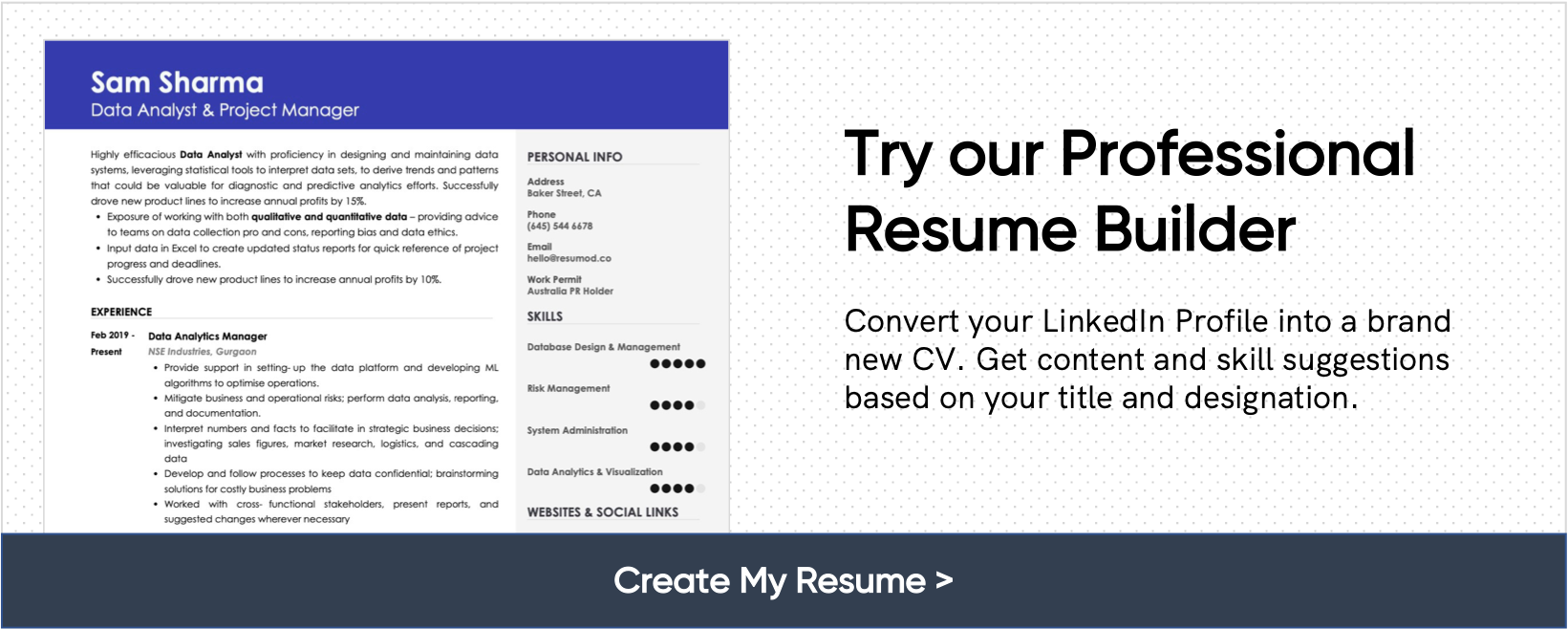How to Write a Resume for Internships: A Comprehensive Guide
So, you're on the hunt for your first internship? Awesome! This is your chance to explore different fields, gain valuable experience, and build your resume for future career moves. But before you dive into applications, there's one crucial step: crafting your internship resume.
Think of it as your cheat code – a one-page magic trick that convinces employers you've got the potential to be an amazing intern. The best part? You don't need years of experience to make it impressive.
This might be your very first resume, so make it count! It's your chance to showcase your skills, achievements, and what makes you tick, all in a way that screams "future rockstar employee!" Tailoring the resume to match the internship requirements and emphasizing relevant experiences can significantly enhance internship opportunities.
In this article:
- How to write a resume for internships?
- What are the essential sections in a resume for internships?
- How to craft a compelling summary for a resume for internships?
- Additional tips for writing a resume for internships
- Top-rated resumes for internships on Resumod
How to Write a Resume for Internships?
Formatting and Design: Keep it Simple and Readable!
Think of your resume as a first impression. You want it to be professional, clear, and easy to navigate. Here are some tips:
- Formatting: Use bullet points and clear headings to make your information pop. Keep the spacing consistent and use a readable font like Arial or Calibri.
- Design: Keep it simple! Save the fancy graphics for your creative portfolio. Choose a clean layout that's easy for the eye to follow.
Your resume is all about YOU. Inject your personality and passion, but keep it professional. By following these tips and tailoring your resume to each opportunity, you'll be well on your way to landing that dream internship that unlocks your future career path!
Optimize Your Resume for ATS
The Applicant Tracking System (ATS) efficiently manages job applications by scanning resumes for specific keywords and criteria set by employers. To improve visibility in ATS:
- Use relevant keywords from the job description throughout your resume.
- Simplify formatting and avoid uncommon file formats.
- Save your resume incompatible file formats such as .docx or .pdf
- Customize each resume with job-specific keywords and phrases.
- Review and edit for accuracy and professionalism.
Before submitting your internship application, finalize your resume and cover letter with a checklist. Ensure all documents are correctly formatted and error-free. When submitting applications online or through email, follow the employer's instructions carefully. After submitting, consider following up with a polite email to express continued interest and gratitude for the opportunity.
What are the Essential Sections in a Resume for Internships?
Crafting compelling content within each section of your resume is essential to capture the attention of potential employers. Here are detailed tips for each section:
Contact Information
- Ensure your name is prominently written in a larger font size.
- Provide a professional email address and an active phone number.
- Include your LinkedIn profile or personal website if relevant and professional.
Resume Objective
- Tailor your objective to the specific internship you're applying for, mentioning the position and company name if possible.
- Highlight your relevant skills and experiences that align with the internship requirements.
- Keep it concise, focusing on how you can contribute to the organization's goals.
Showcase Educational Background
- Mention your GPA if it's impressive, along with your degree, major, and graduation date.
- Highlight relevant coursework that demonstrates your skills and knowledge in the field.
- Include any academic honours or awards you've received, such as scholarships.
Incorporate Academic Achievements and Extracurricular Activities
List academic achievements like winning competitions, publishing research papers, or presenting at conferences.
- Include extracurricular activities that relate to your field or demonstrate leadership and teamwork skills.
- Quantify your achievements whenever possible to show their impact and significance.

Present Education-Related Experiences
Describe any research projects you've worked on, mentioning your role, methodologies used, and outcomes.
- Highlight any training or programs you've participated in, emphasizing what you learned and how it enhanced your skills.
- Connect these experiences to the internship role by explaining how they've prepared you for the internship role.
Prior Work Experience (if any)
Work experiences such as volunteering, or any previous internships would also count.
- Start with your most recent or relevant work experience and list the company name, position, and employment dates.
- Use bullet points to describe your responsibilities and achievements in each role.
- Quantify your accomplishments using action verbs, numbers or percentages, and transferable skills to demonstrate the impact.
Skills
Organize your skills into relevant categories such as technical skills, language proficiency, and soft skills. Tailor your skills section to match the internship requirements, emphasizing those most relevant to the role.
Highlight Transferable Skills
- Transferable skills are versatile abilities applicable across various jobs and industries. Employers value these skills for their role in fostering effective communication, teamwork, problem-solving, and adaptability.
- You can highlight transferable skills from your academic, work, or extracurricular experiences. For example, if you've worked on group projects in college, you can talk about how it improved your teamwork skills.
- If you've ever solved a problem at work or school, share that experience too. Employers love to see how you handle challenges.
- Even activities outside of school or work, like volunteering or playing sports, can help you develop transferable skills.
Incorporating Technical Skills and Certifications
Having the right technical skills and certifications is important for certain internship roles. They show employers that you have the specific abilities needed to excel in that job. Look at the internship description to figure out what technical skills are required. Make sure to mention these skills on your resume, especially if you have experience using them in projects or previous jobs. If you've taken any courses or earned certifications related to the internship role, definitely include them on your resume. This could be anything from completing an online course to getting certified in a specific skill/course. It shows that you're proactive about learning and improving your skills.
How to Craft a Compelling Summary for a Resume for Internships?
A strong resume objective or summary can make or break the deal. It's the first thing employers notice as it sets the tone for your application.
A golden rule is to make it concise yet impactful, providing a snapshot of your career goals, relevant skills, and qualifications.
To write an impactful introduction:
- State Your Career Goals: Clearly state what you aim to achieve through the internship and how it aligns with your career aspirations.
- Highlight Your Skills: Mention key skills and abilities that make you a suitable candidate for the internship.
- Showcase Your Qualifications: Briefly summarize your educational background and any relevant experiences that demonstrate your readiness for the internship.
Examples of effective resume objectives for internship seekers:
- For a Marketing Internship: Aspiring marketing enthusiast seeking an internship opportunity to apply my creativity and strategic thinking in executing innovative marketing campaigns, with a focus on digital media platforms. Skilled in market research and social media management, eager to contribute to a fast-paced marketing team.
- For a Research Internship: Detail-oriented science student with a keen interest in research methodologies, seeking an internship opportunity to contribute to groundbreaking scientific studies and gain practical lab experience. Skilled in experimental design, data analysis, and scientific writing, poised to assist in research projects aimed at advancing scientific knowledge.
Additional Tips for Writing a Resume for Internships
- Tailor the Resume to Specific Internship Opportunities: Customizing your resume for each internship application is crucial. It shows employers that you're serious and a good fit for the role. To align your resume with internship requirements, carefully read the job descriptions and emphasize relevant skills and experiences. Taking the time to research the company's culture and values will help you tailor your resume effectively, showing how well you fit with their values.
- Write an Attention-Grabbing Cover Letter: A cover letter complements your resume, providing a chance to express your personality and enthusiasm. Personalize your cover letter for each application, addressing specific internship requirements and showcasing your excitement for the opportunity. This adds depth to your application and makes you stand out to employers.
- Proofread and Edit the Resume: Proofread and edit your resume to check for content, formatting, and grammar errors. Making sure it's error-free reflects your professionalism. Utilize tools and resources available for thorough checks to make your resume flawless and polished.
- Choose a Professional Email Address When providing contact information, make sure to use a professional email address. Employers expect a professional tone in all communications. Avoid using email addresses like "partylover123" or "gamerboy45," as they can give the wrong impression to potential employers.
- Protect Your Privacy: It's important to maintain privacy and confidentiality on your resume. Personal information like age, marital status, or bank account number is generally not included. Focus on showcasing your skills and experiences relevant to the internship instead.
- Craft Specific Resume Objectives: Generic resume objectives don't grab the attention of employers. Instead, tailor your objective or summary to the internship you're applying for. Highlight your goals and how you can contribute to the organization, showing employers that you're a perfect fit for the role.
- Be Honest and Truthful: Integrity is highly valued everywhere, so it's essential to be honest in your resume. Exaggerating skills or lying about your experiences can damage your reputation and credibility. Employers appreciate authentic and honest candidates, so focus on presenting your genuine abilities and accomplishments.
- Leave Out References and Salary Expectations: References and salary expectations are typically not included on resumes. Employers usually request this information later in the application process if needed. By leaving them out, you keep your resume concise and focused on your qualifications for the internship.
Top-Rated Resumes for Internships on Resumod
Resume of Interior Design Graduate

Check the full resume of interior design graduate in text format here.
Resume of Network Support Specialist

Check the full resume of Network Support specialist in text format here.
Resume of Technical Writer

Check the full resume of technical writer in text format here.
Resume of IT Intern

Resume of IT Intern in text format here.
Resume of BA (Hons) Interior Designer

Check the full resume of BA (Hons) Interior Designer in text format here.
Ultimately, a well-crafted resume is very important for applying to internships. It helps employers understand the qualifications, skills, and contributions an applicant can bring to their organization. Applicants should strive to present themselves in the best possible light, showcasing their unique abilities and demonstrating their enthusiasm for the internship opportunity.
By applying the strategies outlined in this comprehensive guide, applicants can enhance their internship prospects and take a significant step towards achieving their career goals. With attention to detail, professionalism, and a focus on relevance, applicants can create a resume that stands out to employers and sets them apart from the competition.



